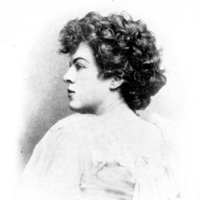In Any Garden
Down his long garden he did slowly go,
For fairer sight did each new path disclose;
Now bent he where the purple asters glow,
Now stayed his feet beside a changing rose.
Like some pale leaf blown by an upward wind,
A butterfly danced in a sunbeam caught,
Then lit upon a lily-bell to find
The honey by some laggard bee forgot.
Upon a mossy step the old dial stood
That told the sunny hours; he climbed to see.
‘Pass slow, sweet shade,’ he said; ‘the world is good,
Yet bless you for the hours that are to be.’
He raised his head the wind blew back his hair.
He heard the clanging of a distant spade,
And saw an old man in the garden fair,
Who all amongst the flowers a havoc made.
Deep, wide, and dark the digger made his bed,—
A fearful hollow in the pleasant place.
‘Why dig you here?’ the youth unto him said;
‘Within this grave what flower would you efface?’
And as he called, the digger paused awhile,
And looked upon him with strange eyes, nor spoke.
So that the youth ran forward from the dial,
And with his call the echoing garden woke.
From flower to flower the echo caught the cry;
The hollyhock let drop its crimson bell
‘For me! Ah, not for me! I shall not die’—
The pale rose shook till all her petals fell.
But when the youth reached that green canopy
Where he had watched the digger, there was none,
Nor any grave. There only could he see
The shadow of the yew tree in the sun.
‘Twas but the shade and shaking of your leaf,’
He smiled—then shuddered as he turned away.
It shook in silent merriment—or grief,
With tears or laughter—which, no man can say.

